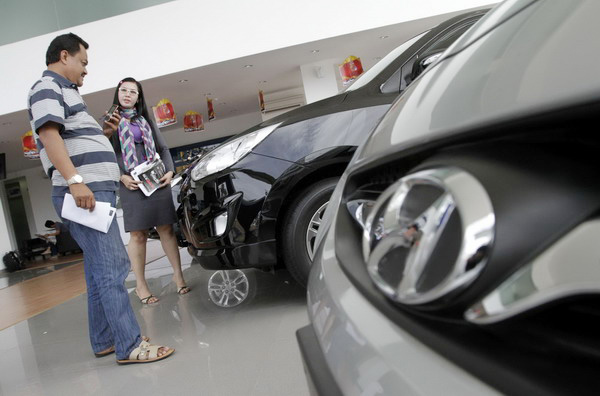|
 A salesperson talks to a customer at a Hyundai dealership in Cibubur, West Java, Feb 19, 2013. [Photo / Agencies] |
Hyundai Motor Co may be missing out on a big opportunity in Indonesia by failing to build a major car factory in the country and paying too little attention to local needs in what has become a key emerging market for global auto makers.
PT Hyundai Indonesia Motor - the South Korean auto maker's exclusive distribution partner - plans to sell 8,000 Hyundai cars this year, grabbing less than 1 percent of overall auto sales which are expected to grow to 1.25 million cars this year, according to company officials.
One big problem is the lack in its line-up of a small, no-frills multi-purpose vehicle (MPV) to challenge the likes of Toyota Motor Corp's Avanza, according to two people familiar with PT Hyundai Indonesia's operations.
"Hyundai needs to wake up and understand the true potential of Indonesia," one of the sources said, noting that many global brands have invested heavily in the country in recent years. Among those is General Motors Co which is expected to start production of a small affordable car soon.
The market, according to some industry officials, appears poised to surpass Thailand as Southeast Asia's biggest by 2016, if not earlier, with sales reaching 2 million cars a year.
The budget MPV with three rows of seating is a high-volume car in Indonesia, where such vehicles account for more than 50 percent of the total demand.
The segment is currently dominated by the Avanza, Daihatsu Motor Co's Xenia and Suzuki Motor Corp's Ertiga - offerings that will soon be joined by a model called the Chevrolet Spin from GM.
"If we don't have a small MPV, how could Hyundai generate big volume?" said one of the sources.
Manufacturing constraints
Maintaining an ample supply of cars is also a challenge for PT Hyundai Indonesia - a closely-held company part-owned by Indonesian businessman Bambang Trihatmodjo, son of former President Suharto - due to manufacturing constraints stemming from Hyundai's decision a few years ago to slow capacity expansion around the world and focus on quality.
As part of that expansion freeze, which has crimped sales in the United States and India, among other markets, Hyundai has scrapped plans to build an assembly plant in Indonesia.
Hyundai has also been focusing its resources on other growth markets such as Brazil and India.
"Hyundai Motor has been expanding rapidly worldwide in recent years, forcing us to allocate our resources in other markets first," said Brian Sir, a Seoul-based Hyundai spokesman, in an email.
"We acknowledge that the Indonesian market has great potential and continue to keep a close eye on new opportunities. For the moment, we do not have plans to build a manufacturing plant there."
The lack of sufficient supply for products also stems from Hyundai's limited production capacity for right-hand-drive cars.
Hyundai sales in Indonesia grew 33 percent and 26 percent in 2011 and 2012, respectively. But the brand remains a tiny player in a market dominated by Japanese auto makers.
Toyota for example, sold some 400,000 cars last year, or slightly more than a third of the country's overall demand.
Hyundai's Indonesian distributor currently sells cars through about 45 retail outlets. It plans to add seven more dealers this year and aims to sell some 10,000 cars in 2014.
The company has a fairly large line-up of cars: the mini Accent and mid-size Sonata sedans, the Tucson and Santa Fe sport-utility vehicles, as well as the large Starex van. Of those, the distributor assembles Starex vans locally using near fully assembled vehicle kits shipped from South Korea.
